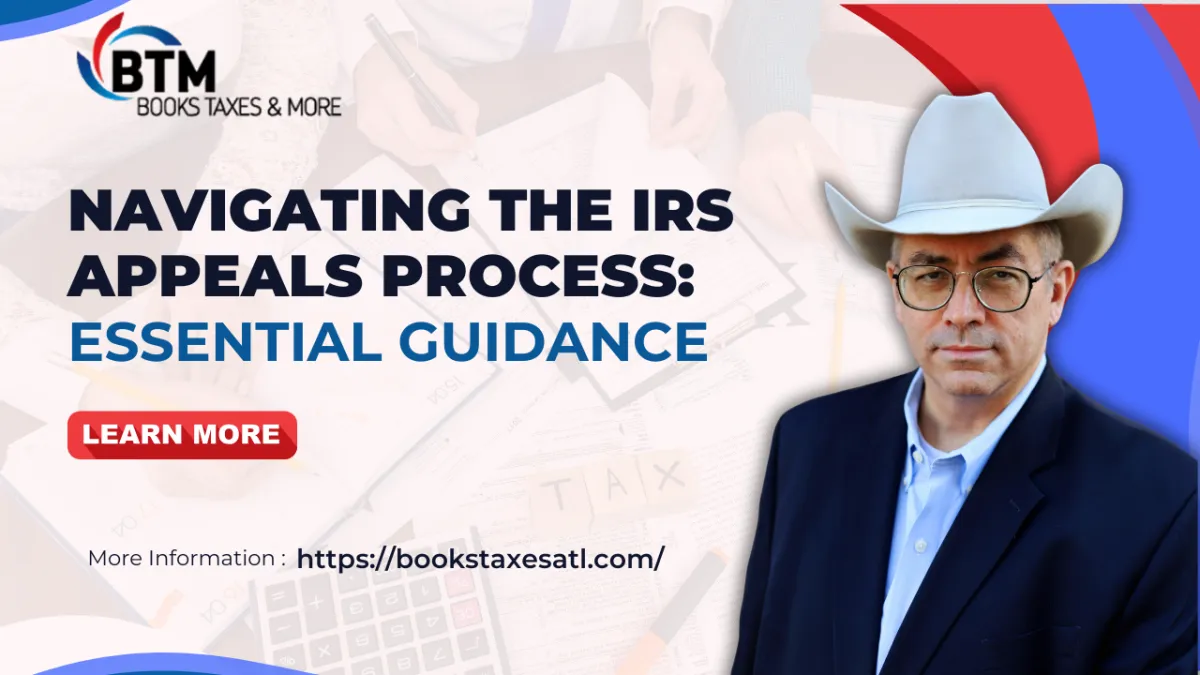
Navigating the IRS Appeals Process: Essential Guidance
When the IRS makes a decision that impacts a taxpayer’s finances, whether it’s from an audit, penalty, or collection action—it can feel overwhelming. The good news is that there are options. The IRS appeals process exists to provide an impartial platform for resolving disputes, and having the right representative can make all the difference.
Steve Perry, Enrolled Agent, a skilled tax representative from Books, Taxes & More takes the lead in building and executing a strategic appeal. Here’s how he does it.
Understanding the IRS Appeals Process
The IRS Office of Appeals is an independent body designed to resolve tax disputes fairly and efficiently—without going to court. Taxpayers can appeal decisions related to:
Audits and examination results
Penalties or interest
Collections, liens, and levies
Rejected offers in compromise
Innocent spouse relief denials
While individuals can file appeals on their own, most lack the experience and tax law knowledge needed to navigate the process effectively. That’s where the right representative comes in.
How Steve Perry, EA Handles Your Appeal
1. Thorough Review of IRS Correspondence
Your representative starts by carefully reviewing the IRS notice or letter to determine:
The nature of the decision
The amount in question
Deadlines and next steps
They'll assess whether an appeal is appropriate and advise on the best course of action.
2. Building a Strategic Protest or Appeal Request
If you’re disputing more than $25,000, a detailed written protest letter is required. For smaller amounts, Form 12203 may suffice. Either way, the representative:
Gathers supporting documentation
Crafts a compelling argument
Aligns the case with relevant tax codes and precedents
This isn’t just paperwork—it’s the case foundation.
3. Handling the Appeals Conference
The representative will present the case during a conference with an Appeals Officer—a neutral IRS employee who wasn’t involved in the original decision.
This is often where real negotiation happens. A knowledgeable representative:
Communicates your position clearly and professionally
Understands how to negotiate based on the IRS's "hazards of litigation" model
Knows when to compromise and when to stand firm
4. Pushing for Resolution or Further Action
If an agreement is reached, Steve ensures the terms are fair and documented properly. If not, he may recommend elevating the case to the U.S. Tax Court and guide you through that process as well. If the case is complex, he may refer you to an appropriate attorney.
The Key Traits of an Effective Tax Representative
Not all tax professionals are created equal. The most effective representatives bring a blend of:
Deep tax knowledge – especially in the specific area under dispute
Strong communication and negotiation skills
Strategic thinking – to find creative, law-supported solutions
Experience with the IRS – knowing how appeals officers operate and what to expect
Whether it’s an enrolled agent, or tax attorney, the right representative is your advocate—defending your rights and working to secure the best possible outcome.
Final Thoughts
The IRS appeals process gives taxpayers a real chance to correct unfair decisions—but success depends on how the appeal is handled. The right representative leads the way, acting as a powerful ally who understands the process, speaks the IRS’s language, and fights for the client’s financial interests. Steve Perry, EA’s education, experience and passion qualifies him in every way.
If facing a tax decision believed to be wrong, don’t go it alone. Steve Perry, EA from Books Taxes & More, doesn’t just file forms, he builds the case, handles negotiations, and offers the best shot at a favorable resolution.
Call or email Steve at Books, Taxes & More. His direct line is 678-717-9818.
